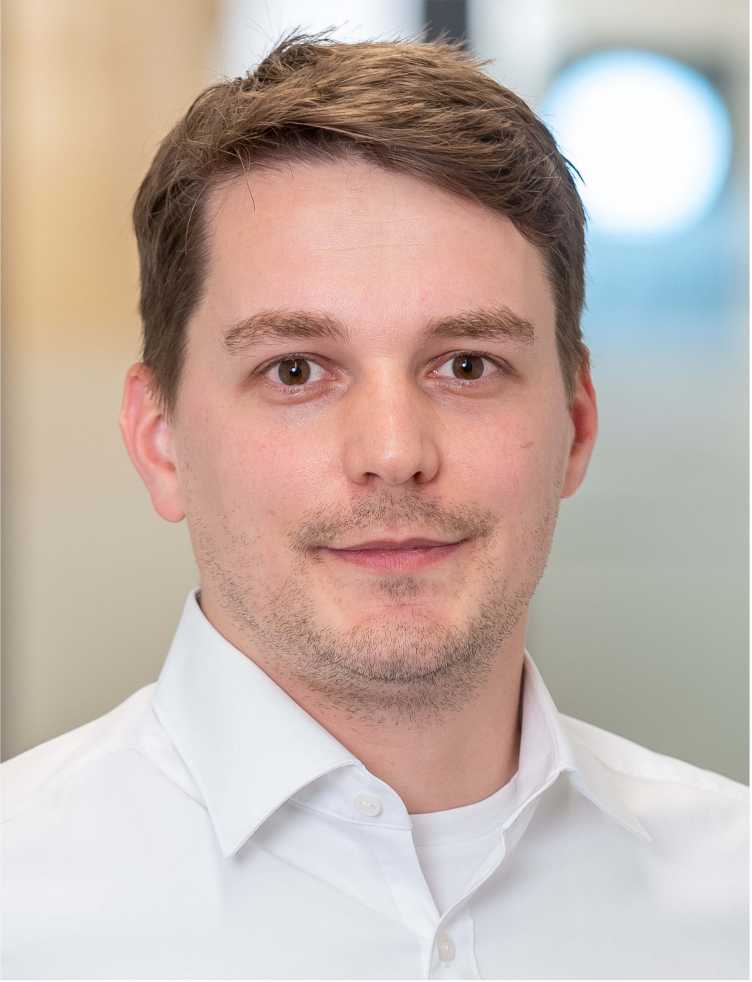Electronics with a sense of smell
Andreas Güntner has been appointed Assistant Professor of Sensor Technology at the Department of Mechanical and Process Engineering. Starting 1 September 2022, the 34-year-old German will conduct research at the Human-centered Sensing Laboratory (HSL) of the Institute of Energy and Process Engineering.

You are co-founder and CEO of Alivion, a spin-off of ETH Zurich, have been conducting research at ETH and University Hospital Zurich for several years, and have now been appointed professor. How do you reconcile all these tasks?
There has indeed been a lot going on in the past few years. However, all these activities are interrelated and pursue the overall goal of providing electronics the sense of "smell." I imagine that in the future, a single exhalation on a smartphone could be enough to detect illness. That's what drives me.
I discovered my passion for this topic during my doctoral studies at ETH Zurich, when we developed tiny sensors from nanoparticles. The move to the University Hospital Zurich last year then enabled me to test these sensors directly on patients in collaboration with doctors.
With Alivion, we are going one step further. We want to let society participate in these technologies by developing the right products for them and making them available to everyone. However, my greatest passion is research and the education of young talents. That's why I couldn't resist the offer to return to ETH Zurich as a professor.
What do you like best about these diverse tasks?
What I appreciate most is the opportunity to work with great people from very different fields, such as engineering, medicine, or industry. I find it very enriching to discuss different perspectives and approaches. This has certainly been the nucleus of the numerous innovations in recent years.
What are your main areas of research? And what are the biggest challenges?
Essentially, it's about making chemical information measurable and thus usable, which is stored by nature in tiny molecules. To do this, we use the ability of nanostructures to interact with these molecules and to convert their presence into measurable – that is electrical or optical - signals. Only one gram of these nanostructures can have a surface area of more than 100 square meters.
The big challenge now is to design these nanostructures in such a way that they respond as sensitively and selectively as possible to the molecules of interest. Sometimes the target molecule is only present in very low concentrations of, say, one in a billion, which makes our search appear a bit like looking for a needle in a haystack.
What fascinates you about this topic?
The potential is enormous. Imagine your smartphone could smell and tell you if there were harmful substances in the air or know what disease you have based on the air you breathe. The Human-centered Sensing Lab is all about that. We focus on applications for the following topics: First, on the detection of hazardous molecules in indoor air and in food to prevent health damage. On the other hand, we want to develop new methods for medical diagnostics and monitoring. This involves the painless measurement of biomarkers in the air we breathe in order to detect diseases at an early stage and monitor their treatment in a personalized manner. This could supplement or even replace more complex procedures such as blood analysis or biopsy. Dogs can already do this to some extent with their sensitive nose.
What matters to you most in teaching?
The student body and its technical training at D-MAVT are world class, and it will be a pleasure for me to actively continue this tradition. Through my teaching, I would like to add technical expertise to the degree program in the areas of Mobile Health Technologies and Chemical Sensing. In addition, there are three things that are particularly close to my heart that I would like to promote in project work: a critical and multidisciplinary mindset, an eye for detail, and professional communication of research results.
You have actually already done your Bachelor's degree at ETH Zurich. What do you like best about ETH?
I chose ETH for the Bachelor's and the Master's degree because of its good reputation. The decisive factors for the doctorate was the opportunity to work with excellent researchers and the access to the unique infrastructure. The decision to return to ETH Zurich to take up a professorship within the framework of an ERC Starting Grant was largely influenced by the proximity to the University Hospital Zurich. Where else do you have the opportunity to research new technologies with modern facilities and then test them directly on patients a few meters away in one of the world’s best healthcare facilities? For these conditions, I was also prepared to turn down some very attractive offers from abroad.
How do you find a balance between work and personal life?
To unwind from work, the most important thing is my family. With two daughters (2 and 4 years old), my free time is usually very varied with skiing/sledding, swimming, hiking, barbecuing in the woods, or gymnastics. I also like to meet friends spontaneously for a workout or we just go out for a beer in the evening.
Short profile
- Since 2021 Researcher, Clinic for Endocrinology, Diabetology and Clinical Nutrition, University Hospital Zurich
- 2021-2022 CEO and co-founder Alivion AG, Menzingen, Switzerland
- 2017-2021 Postdoctoral researcher, research team leader and lecturer, Particle Technology Lab, ETH Zurich
- 2016 Doctoral degree in Mechanical Engineering, ETH Zurich
- 2014 Master's degree in Mechanical Engineering, ETH Zurich